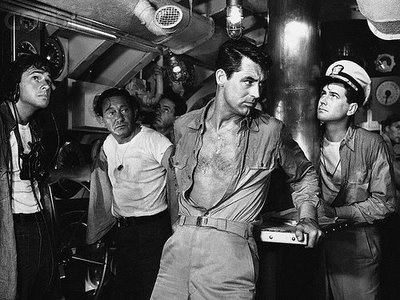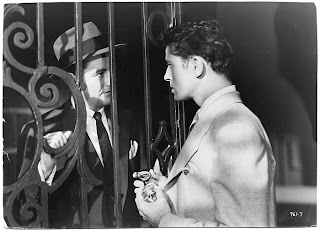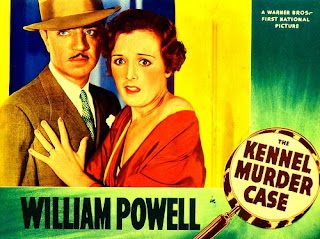
Perhaps the greatest on-screen marriage of all times is that of Nick and Nora Charles, the sleuthing partiers-turned-parents that were originally created by legendary mystery writer Dashell Hammett. The films they appeared in have been collected in a DVD boxed set that is worthy of them.
Warner Bros. pulled out all the stops for "The Thin Man Collection", a seven DVD set that presents near-flawless transfers of the "Thin Man" comedies from the 1930s and 1940s and such a huge selection of extras that most other DVD sets you buy after this one will feel overpriced.
For around $40 (if you buy the set through Amazon.com), you get all six classic Thin Man comedies starring William Powell and Myrna Loy, excellent documentaries on Powell and Loy, and a wide selection of cartoons and short features. In fact, every disc in the set can be used to replicate an "old time night at the movies," with short films to watch before the feature presentation. Each every one of them is fascinating and great fun, with the "Tell-Tale Heart" adaptation included is particularly excellent.
If you haven't seen the Thin Man flms and have any appreciation for classic comedies or the detective films of the 1930s and 1940s, you absolutely must, at the very least, see "The Thin Man". If you need a gift for someone who loves classic movies, you can't go wrong if you get them "The Thin Man Collection". I guarentee they will love every minute of it.
As for the Thin Man movies themselves, read on for my take on each of them.
The Thin Man (1934)
Starring: William Powell, Myrna Loy, Maureen O'Sullivan, Nat Pendleton, Edward Ellis, Mina Gombell and William Henry
Director: W.S. van Dyke
When the return to New York City of retired ace private detective Nick Charles (Powell) coincides with a former client (Ellis) disspearing while under a cloud of suspicion of murder, everyone from cops to crooks assumes he's on the case. Nick, however, wants nothing to do with crime-solving, preferring instead to celebrate the Christmas holiday with his loving wife Nora (Loy) in a drunken stupour. When bullets start flying in his direction, and a police detective (Pendleton) starts drawing conclusions that are obviously wrong to Nick, he takes up the case with his terrier Asta on a leash in one hand and a drink in the other.

"The Thin Man" is one of the best comedy/mysteries ever made. It's got a strong mystery driving the plot, it's got incredibly funny dialogue of the sort that very few writers are capable of creating today and even fewer actors are capable of delivering properly, and it features one of the funniest, warmest martital relationships to ever appear on film. I think this is also probably the only movie where the detective spends the entire story--which spans several weeks--drunk as a skunk!
Although it was filmed by the low-budget division of Warner Bros., "The Thin Man" was the most popular film of 1934 and it was nominated for four Academy Awards, including Best Picture and Best Actor (for William Powell). It's easy to see why. Powell and Loy's onscreen chemistry and high-energy bantering gives the impression of a very believable couple who are deeply in love and equal partners in their relationship, even if she's from a background of wealth and he's come up from the street. They're equally witty, equally adventerous, and equally hard-drinking.
Another aspect of the film that is hilarous is the spoofing of detective fiction mainstays.
Like Sherlock Holmes, it seems that every other person in Nick Charles' circle of friends and acquaintances is a crook he sent to jail at one point--most of the guests at the Christmas party held by Nick and Nora are of the criminal class--and most of the people he has chance meetings with are of the same type. (Yet, Nick is so charming and likable that even criminals he sent up the river end up being his pals.)
Even funnier is the spoofing of the typical Agatha Christie climax where the detective gathers all the suspects together to reveal who the murderer is. Here, Nick and Nora throw a very expensive dinner party and Nick has his police detective friends bring the guests wether they want to come or not. Nick playing host while unspooling his theory of the crime at the same time leads to some very funny misunderstandings at the table.
With William Powell and Myrna Loy providing the film with a solid center of charm and wit, and a cast of excellent supporting actors including Maureen O'Sullivan and Nat Pendleton orbiting around them, "The Thin Man" is a comedy classic that is as fun and entertaining today as it was when it first premiered nearly 75 years ago. It's a movie that is well deserving of the label "classic."
After the Thin Man (1936)
Starring: William Powell, Myrna Loy, Elissa Landi, Joseph Calleia, Sam Levene, Polly Singleton, James Stewart and George Zucco
Director: W.S. Van Dyke
Rating: Eight of Ten Stars
Nick and Nora Charles (Powell and Loy) return to San Francisco hoping to spend a quiet New Year's Eve alone at home. But they arrive to find their house full of revelers who are there for a surprise party in their honor and Nick is quickly (and reluctantly) drawn into a scandal brewing around Nora's wealthy relatives: It starts with the gold-digging husband of her cousin (Landi) vanishing and gets worse when she becomes the prime suspect in his murder.

"After the Thin Man" is a fast-paced mystery movie that lovers of classic films will enjoy quite a bit. It delivers a solid story portrayed by a talented cast and filmed with a high degree of skill. It's good, but it's nothing rises to the dizzying heights of hilarity as "The Thin Man", nor is the back and forth of loving putdowns and snappy comebacks between Nick and Nora as free-flowing.
This is still a very well done comedy mystery that captures the feel of San Francisco's high society during the Roaring Twenties, and if it wasn't the follow-up to a masterpiece, I might have felt a little less dissapointed in it. The fact is, though, that it's not until the final ten minutes of running time that the movie fully exhibits the qualities that made "The Thin Man" such an amazing film.
William Powell and Myrna Loy are as charasmatic here as they were in the first movie, even if the script isn't quite as good. They aided by a great supporting cast of talented actors who present a gallery of quirky and suspicious characters, with a young James Stewart giving a particuarly good performance. In fact, James Stewart's performance is a key element of the ending being as effective as it is. (The very cute denoument will also leave you with a smile on your face and thinking about checking out the sequel, "Another Thin Man".)
Another Thin Man (1939)
Starring: William Powell, Myrna Loy, Otto Kruger, Nat Pendleton, C. Aubrey Smith, Virginia Grey and Tom Neal
Director: W. S. Van Dyke
Rating: Seven of Ten Stars
One-time party-circuit mainstays and trouble-magnets Nick and Nora Charles (Powell and Loy), now the proud parents of a baby boy, have resolved to put their wild lives of partying and crime-solving behind them. However, when the manager of Nora's investments (Smith) is murdered under mysterious circumstances, the pair are drawn into solving a mystery where the only apparent suspects either have air-tight alibis or end up dead themselves.

It is said the couples mature once they have a child and Nick and Nora seem to be holding true to that in their third cinematic adventure, "Another Thin Man". There's no partying--with the exception of just about everyone Nick ever "sent up the river" in New York bringing babies to the Charles' residence to help celebrate Nicky Jr.'s first birthday--very little boozing (even if Nick sneaks a drink every chance he gets) and while a visit to a night-time hotspot shows that Nora can still wrap any man around her finger, it ultimately serves to give another illustration of the deep affection that she and Nick have for one another and to underscore their newly discovered maturity.
Although the tone of "Another Thin Man" is a little different than the two previous movies, it's still very funny. The humor now revolves mostly around Nick and Nora's marriage (and Nick's rough-and-tumble past) and their relationship with one another remains as playful as ever even without the free-flowing booze. The mystery featured is also very fascinating although it gets a little too tangled for its own good and comes across as just a little too far fetched, something I suspect even the writers were aware of since they had a character comment that she feared the scheme was too involved.
The cast all do an excellent job, and I think letting Nick and Nora "grow up" was a wise decision, not just because they have a child now, but because it seems believable; William Powell and Myrna Loy were starting to show the fact they were well into their middle years, so it seems right that the most beloved characters they ever portrayed should age and mature as well. The only dissapointment I felt with this second sequel to "The Thin Man" was that the now-expected round-up of all the suspects and Nick ultimately fingering the murderer was not as funny as the one in the original film, nor as dramatic as the one in "Another Thin Man". (The twist revelation of the killer's identity is undermined in part by the performer in the role not having the talent of James Stewart--the shift in personality and demeanor simply isn't as convincing or shocking.)
Shadow of the Thin Man (1941)
Starring: William Powell, Myrna Loy, Sam Levene, Lou Lubin, Barry Nelson, Donna Reed, Henry O'Neill, Stella Adler, Loring Smith and Joseph Anthony
Director: W.S. Van Dyke
Rating: Six of Ten Stars
When a friend is accused of murdering a shady journalist, Nick and Nora Charles (Powell and Loy) are drawn into an investigation of a large racketeering and gambling operation.

"Shadow of the Thin Man" is the fourth installment in the Thin Man series, and it is the weakest entry so far. Stars William Powell and Myrna Loy display the same on-screen chemistry they've shown since the series' beginning, and Nick and Nora's relationship is as fun and interesting to watch unfold as ever, but the script they are working with here is average fare for the comedy/mystery genre of the day. The only unusual touch is Nick and Nora's son, Nick Jr. It's rare to see a wise-cracking movie detective like Nick Charles wrapped around the finger of a four year-old kid.
Although light on plot and jokes, the film still features a fine cast, a brisk pace, and a nice mystery that unfolds mostly in the open so the attentive viewers can solve the crime along with Nick if they choose. The humor and the great chemistry and charm of William Powell and Myrna Low make this film as entertaining today as it was in 1941. The only reason I felt a little dissapointed in the film was because it follows such a trio of excellent films that it feels like it represents a severe drop-off in quality.
The Thin Man Goes Home (1944)
Starring: William Powell, Myrna Loy, Harry Davenport, Lucile Watson, Gloria DeHaven, Edward Brophy, Lloyd Corrigan, Helen Vison and Leon Ames
Directors Richard Thorpe and Norman Taurog
Rating: Seven of Ten Stars
While Nick and Nora Charles (Powell and Loy) are vacationing in the small town where Nick grew up, a man is assassinated, literally in the doorway of the home of Nick's parents. Nora thinks this is a perfect opportunithy for Nick to show his father he isn't the drunken lout he believes him to be, and she pushes Nick to investigate the crime.

"The Thin Man Goes Home" is a change of pace and scenery for the classic "Thin Man" series of comedy-mysteries. Instead of being set in the swanky rooms of the wealthiest in America's largest cities, it takes place among the rich and powerful citizens in a picturesque small American town... and they are revealed to be every bit as vicious and self-centered and potentially evil as their supposedly more urbane counterparts.
The mystery in this film is more multi-faceted and involved than the one Nick was confronted with in the installment of the series immediately prior to this one ("Shadow of the Thin Man", review here), making the film more interesting. The jokes and physical humor in this film are also funnier and more finely honed than they've been since the first movie in the series, making this the best sequel since "After the Thin Man", review here).
Another difference in the film is that Nick actually solves the multiple mysteries that are tangled together in this film stone cold sober! Nick doesn't touch a drop of alcohol for the entire movie, because he is trying to impress his father (and also because in 1944, liquor was being rationed due to the war effort).
What is the same, however, is the wonderful onscreen chemistry between William Powell and Myrna Loy, and the continued portrayal of the pefect married relationship shared by the Charleses. I really can't think of an on-screen married couple that are as fun as these two and the back-and-forth between these two characters are as important to these films as the mysteries. (Relationship highlights in this film include a fun exchange over Nora's failed attempt to set up a lawnchair; Nora buying a birthday present for Nick thinking it is tied to fond memories and later discovering that she didn't get the full story when it came to his childhood reminicing; and Nick stranding Nora at a charity dance with a jitterbugging sailor so he can go on an investigation. Actually, the scene at the charity dance is one of the highlights of the entire Thin Man series!)
It maybe nearly 65 years since "The Thin Man Goes Home" was made, but the humor is still fresh and story is as good, and even better, than the vast of majority of films that have been made since.
Song of the Thin Man (1947)
Starring: William Powell, Myrna Loy and Keenan Wynn
Dierctor: Edward Buzzell
Rating: Six of Ten Stars
Socialites Nick and Nora Charles (Powell and Loy) find themselves fish-out-water as they navigate a different type of party scene--that of jazz clubs and beatniks--to clear a hood-gone-straight of a murder charge.

The second to last line that William Powell speaks as Nick Charles is, "I'm going to retire."
Almost every aspect of "Song of the Thin Man" seems to be geared toward underscoring the point that the Charles' are getting a bit long in the tooth and that it is, indeed, time to retire.
Their one-time freewheeling party life has become focused on charity dinners and similar events, Nick is no longer recognized and welcomed everywhere he goes by cops and robbers alike--they all seem to have already retired--and when they do venture into the roaring jazz scene of the late 1940s, they are confused and disconcerted by what they find. To top it off, a real threat is launched against young Nick, Jr. as the couple are off on their investigation.
More than in any other of the Thin Man films, we see Nick and Nora out of their element, and we see that they're uncomfortable. While this occured in earlier films, they usually charmed their way through any possible discomfort, but they can't quite pull that off here. They are well into middle age, and the world is starting to accelerate past them.
While Myrna Loy is as gorgeous as ever, despite clearly being about a decade-and-a-half older than when the first film was made, William Powell looks tired in this film and even older perhaps than his 58 years. He looks like someone who would be uncomfortable around weird jazz musicians, and it's a shame, because Nick Charles shouldn't be uncomfortable around anyone.
Despite the fact that Nick and Nora feel like they are past their prime, Myrna Loy and William Powell still show the tremendous on-screen chemistry that carried this series from the very beginning. In fact, because the characters seem older and calmer, the chemsistry between the actors comes through even stronger. The true love that Nick and Nora have for each other is obviously one that will last until death do them part.
Aside from being saturated with the feeling that Nick and Nora's day has come and gone, the script for "Song of the Thin Man" is one of the weaker ones in the series. It's better than the one for "Shadow of the Thin Man", but it's a long way from the one that launched the series or even the one that immediately preceeded it, "The Thin Man Goes Home". The "big reveal" is particularly weak, almost as if the writers didn't quite know how to handle the Agatha Christie-style "gathering of the suspects" climax that had become part-and-parcel with the series. I almost wish they'd broken with convention, because they do a very poor job of trying to work it in.
Despite the fact that I felt a slight melancholy while watching the film, because of the sense that these two beloved characters were over-the-hill, "Song of the Thin Man" is still a funny comedy mystery with a plot that you aren't likely to figure out all the components of until Nick forces the truth into the open in the film's last minute. It may not be as good as early entries in the series, but it's still a film that holds up extremely well and that is as enjoyable now as it was sixty years ago.






































.jpg)
